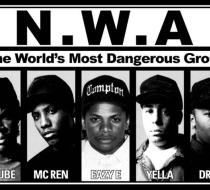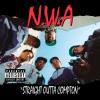The World's Most Dangerous Rap Group: NWA Favorite
In 1988, rap group the N.W.A from Compton, California released their second album, “Straight Outta Compton”. Without any radio play or media coverage, the album still managed to become an underground hit, and the notorious rap group successfully introduced socially conscious gangsta rap into the mainstream.
Upon its release, the album was predominantly well received by its audience and music critics. In fact many referred to the body of work as the best, exciting and innovative; however, several songs did trigger political controversy. In the November 1999 edition of RollingStone, Shinéa O’Connor stated, “It’s definitely the best rap record I’ve ever heard. Of course, I can see why people might be offended by the lyrics, but as a human being and not as a public figure, I’m not offended at all. I realize from reading interviews with people like Ice Cube, when they explain that they’re not talking about women in general, but about particular women they know, it makes a lot of sense”.
“Fuck Tha Police” appears as the second song on the album, the narrative highlights the ongoing tensions between African American urban youth and law enforcement. The song stands out amongst the rest because of its controversial message. For the full lyrics refer to the bottom of the page.
The narrative begins with members of the group testifying before the judge of the court, Dr. Dre, as he presides in the case of N.W.A vs. the Police Department. In doing this, the rap group is mocking the process of the judicial system. Only commending respect for the role of the witness, as an opportunity for MC’s to speak up and prove racial stereotyping through rap lyrics.
In an interview from 1989, a 20-year-old Ice Cube reflects, “Whenever the media shows California, all they picture is beaches and pretty girls”.[1] The narratives of “Straight Outta Compton” was intended as a documentary to show the other side, uncover the reality of life in the ghetto, and the daily violence of city gangs.
Early in the interview, Ice Cube illustrates what life in the hood has been like for him. He says, “If you sat on this porch at night and just listened real hard, you’d hearing nothing but gunfire. I’ve heard it so much in my neighborhood that I can’t hear it no more… As long as you can’t see where they’re coming from, gunshots aren’t scary. Now, if you see the fire from the gun, then you run…” [2] Through the lyrics “Fuck Tha Police”, the N.W.A is undoubtedly frustrated and criticizing local law enforcements for racial profiling, and ongoing police brutality.
Several months after the release, Ice Cube addresses the controversial messages in an MTV interview. He explains, “… We ain’t talking about all policemen, but there’s bad police out there. A lot of people pretend that these kinds of police brutality and stuff like that don’t happen in their city… They’re saying we’re infesting their kids to believe cops are bad, and we just tellin’ the truth and it goes for damn near every city”. [3]
“Fuck Tha Police” was the first song in history to question pop music censorship and first amendment rights. The controversial lyrics against the police resulted in the Federal Bureau of Investigation sending a letter to Priority Records, the group’s distributor of “Straight Outta Compton” and other albums. The letter was written by the Assistant Director of the FBI Office of Public Affairs, who at the time was Milt Alerich. He wrote, “Advocating violence and assault is wrong, and we in the law enforcement community take except to such action… I wanted you to be aware of the FBI’s position relative to the song and its message. I believe my views reflect the opinion of the entire law enforcement community”. [4]
While the FBI never pursed the matter legally, they publically blamed the song for violent attacks against the police force. An FBI representative recounted, “…78 law enforcement offers were ‘feloniously slain in the line of duty during 1988… and recordings such as the one from N.W.A are both discouraging and degrading to these brave, dedicated officers”. The letter was intended for individuals responsible for the licensing and distribution of the song, so they could have the benefit of knowing the so called, “the facts of police violence”. [5]
Many public figures, activists and fans believed the FBI stepped out of line and in general should have no say in censorship legislation. Danny Goldberg, the chairman of the Southern California, affiliate of the America Civil Liberties Union voiced, “It is completely inappropriate for any government agency to try to influence what artists do. It is completely against the American traditions of free speech and government non-interference for government agencies to criticize art…” [6]
While many spoke out against the FBI’s letter, members of the N.W.A remained silent. The first comment came from the rap group’s publicist, Pat Charbonnet, stating the letter “…Makes valid everything said on the record. Their life is a lifetime of hassle and it never stopped being that way”. [7]
Over a year later, both the record and the letter were still fusing social controversy when the N.W.A finally commented. Ice Cube stated, “There is a lot of resentment of police because if you are black you get picked on a lot… The song is a way to get out aggression”. He refers to the letter implementing “…More harm than good… It reinforces the notion among minorities that the government is against them. N.W.A is a positive role model about how you can get out of poverty, and then the FBI writes them a letter”.
In responding this way, the FBI and local law enforcements are contributing to the youth’s feelings of oppression and dissociation from society. Oppressing their most powerful form of expression and community, feeds into the youth’s anger and frustration, which then results in violent actions. True rap has become one of the most positive roles in Hip-Hop politics because it demonstrates how disposed individuals/groups can direct their pain and energy into powerful, and influential body of art. Not only is this a mode of education and awareness, but also it’s away to escape.
Those sheltered from urban violence not only fear the reality, but the messengers and what they have to say. Seeing as the problems aren’t occurring in their respective neighborhoods, they want to pretend as if they don’t exist. The N.W.A’s mission was to expose the truth.
“Peace is a fictional word to me… We deal with reality. Violence is reality. When you say something like that, it scares people. You’re supposed to picture life as a bowl of cherries, but it’s not. So we don’t do nothin’ fake”. [8]
“We told the truth on this record, so now we’re gonna teach the truth. Now we got a bigger audience that buys our records and likes us but don’t really understand. We’re gonna show them the raw reality of life. When they come out the other end, they gonna say, ‘Damn, it’s like that? For real?’”. [9]
https://wordpress.clarku.edu/musc210-hhp/hip-hop-culture-politics-explor...








